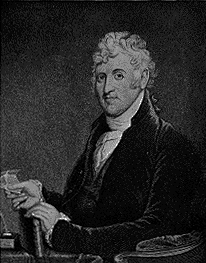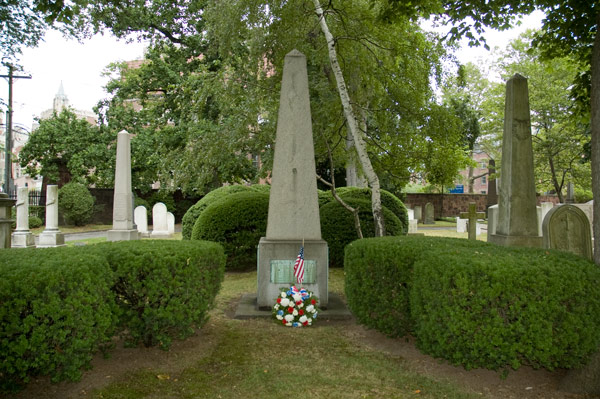Derby History Quiz
Archives of all quizzes


David Humphreys
When Lord Cornwallis surrendered the British colors at
Yorktown effectively ending the Revolutionary War, it was Derby native
David Humphreys who had the distinction of receiving them and
conveying them to the Congress in Philadelphia. This remarkable man later
introduced Merino sheep to Connecticut and established the first factory
village in the United States - Humphreysville (now Seymour) where
some of the finest wool in the country was spun. Customers included U.S.
President Thomas Jefferson who once commented that, "The best fine
cloth made in the U.S., I am told, at the manufacture of Col. Humphreys...."
Humphrey's birthplace in Ansonia is now the home of the Derby Historical
Society. Click
here to learn more.
The following had correct answers
to this quiz: Mayor Marc Garofalo, Rick Dunne, MarkAnthony Izzo, Kimberly
Shelton, Adam Rak, C. F. Douglass, Randy Ritter, Mary Lou Boroski and
Marsha Pettingill.
Some further history (From the Connecticut Sons of the
American Revolution):
David Humphreys was born in Derby, Connecticut, the son of the Reverend
Daniel Humphreys and Sarah Riggs Bowers Humphreys. He earned his Bachelor
of Arts degree at Yale University in 1771 and a Masters degree in 1774. He
taught school briefly from 1771 to 1773 in Wethersfield, Connecticut and
then became a tutor in New York from 1773 to 1776. With the outbreak of
the Revolution, David Humphreys joined a New York Militia regiment in
1776, and later rose in the 6th Connecticut Regiment to the rank of
Brigade Major. He successively became an aide to General Putnam (in 1778),
General Nathaniel Greene (in 1780), and General George Washington (from
June of 1780 to the end of the hostilities), attaining the rank of
Lieutenant Colonel.
In 1784, Humphreys was appointed by Congress as Secretary of the committee
designated to negotiate commercial treaties in Europe, working chiefly
under Jefferson. Humphreys’ conservative (Federalist) political
convictions had not yet fully formed, and he and Jefferson were friends
until a falling out in 1801, when the third president recalled him from
his post overseas, thus ending his diplomatic career. In 1786, he was back
in Connecticut as a member of the State’s General Assembly. He was then
made Colonel of a United States detachment to suppress Shays’s Rebellion
in 1787. He spent long periods of time with the Washington's at their
Mount Vernon estate where he was a trusted advisor and confidant of
President Washington. In 1791, he was named the first United States
Minister to Portugal. In 1796, he was made Minister to Spain, where he
developed an interest in sheep breeding, and he eventually introduced the
Merino breed into Connecticut, drastically improving the American
production of quality wool. In 1797, he married Ann Francis Bulkeley, the
daughter of an Englishman who did business in Lisbon, Portugal.
After 1801 and his replacement by Jefferson, Humphreys, now back in his
native Connecticut, had the satisfaction of seeing his own woolen and
cotton mills thrive. As he grew older, honors came to him from Brown
University, Dartmouth College, and through membership in the British Royal
Society. He was commissioned a brigadier general in the Connecticut
militia in reaction to the War of 1812. When he died at New Haven he was a
respected and successful citizen, merchant, and writer.

Humphreys grave in the Grove Street Cemetery in New Haven
The events of David Humphreys’ life did not make him a traditional hero
of the American Revolution nor did they place him in the limelight. He was
content to work hard in the background of the emerging Republic as an
advisor, a negotiator, and a principled and devoted servant to the
principles of Democracy and free enterprise. General David Humphreys was a
man who believed in the ideals of freedom, a man who worked behind the
scenes, for the most part, to promote and assure the highest ideals of our
new nation. He demonstrated, time and again, unswerving loyalty to his
superior officers and to the men who served under him. We honor him as a
hard-working citizen who lived the principles of the new Republic he
helped to form.
To see our earlier quizzes and learn more about Derby's unique
history, click here.

 Back to
Derby Home page Back to
Derby Home page |

